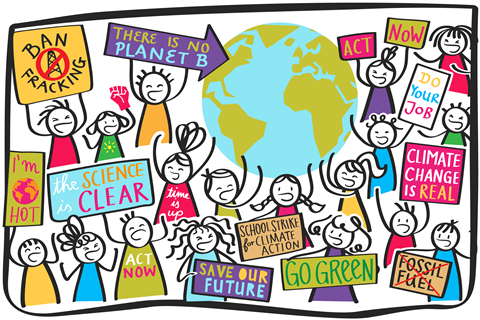Learners don’t study it at school, so they turn to the internet. Let’s change that and teach about our environment

Was I in alone in thinking the Prince of Wales was right not to travel to Australia for the FIFA Women’s World Cup final? It’s not that I thought the President of the FA doesn’t have a role to play in supporting the national team. Rather it’s that the final was in Australia and I was worried about his carbon footprint.
Simply scanning the headlines in national and international media is terrifying. From wild fires to flooding, people are dying because of climate events this summer. But international organisations, governments, big business, scientists and analysts all acknowledge the problem, and are seeking solutions. Aren’t they? And learners are studying climate change in schools, aren’t they? No and no.
Leaving it to online sources
Secondary school learners are not studying climate change. ‘In the current curriculum, many young people receive an incomplete environmental education,’ writes ex-teacher and RSC education policy specialist, Aylin Ozkan in the essay collection, Heartwood.
Secondary school learners are not studying climate change. ‘In the current curriculum, many young people receive an incomplete environmental education,’ writes ex-teacher and RSC education policy specialist, Aylin Ozkan in the essay collection, Heartwood (bit.ly/3EiKclz).
When climate change does appear on school curriculums, it’s often on the specifications for non-compulsory subjects, such as geography. It will be a focus of the new natural history GCSE, which is due to kick off in 2025. So surely there’s hope right there? Well, no, not necessarily. It’s a non-compulsory subject, and schools will only offer it if they have staff available.
Leaving environmental education to non-compulsory subjects and to the latter years of secondary education tells learners that it’s not important, that they don’t need to know, that it doesn’t concern them. Some learners will still be curious. How do they satisfy their curiosity?
From my limited experience, they turn to YouTube. I watched as the now 18 and 19 year-olds in my life relied on these online videos to gain knowledge, when they joined Greta Thunberg’s school strike for climate in 2019 – and were put off by the negative vibe. Aylin writes of year 12 students who sourced their information from TikTok and were discouraged by the doom-and-gloom narrative they found.
Facing the future with optimism
Instead of leaving young people to source their own information about the state of our environment and climate change threats, we should be giving them knowledge. And that knowledge should be in compulsory subjects, such as science but also English. Only then we can ensure they know what damage has already been done, understand the challenges ahead and, importantly, have the beginnings of the tools to face them.
Let’s not simply force feed them knowledge of the harm already done to our environment. Instead let’s inspire them to act and see the opportunities to change the tide.














2 readers' comments